Understanding the Nursing Instructor Position
A nursing instructor plays a pivotal role in shaping the next generation of healthcare professionals. They are responsible for imparting knowledge, skills, and values to nursing students, preparing them to excel in their careers. The position requires a unique blend of clinical expertise, teaching abilities, and a genuine passion for nursing education. Before you even begin writing your nursing instructor cover letter, it’s essential to fully understand the responsibilities and expectations associated with this role. This includes staying updated with the latest advancements in nursing practice and educational methodologies. Understanding the institution’s mission, values, and the specific needs of the nursing program is also crucial. Demonstrating this understanding in your cover letter will show the hiring committee that you are a good fit for the role and are prepared to contribute to the program’s success.
Key Skills and Qualifications for a Nursing Instructor
To excel as a nursing instructor, you need a strong foundation of clinical experience, teaching skills, and a deep understanding of nursing principles. Your cover letter is the perfect place to highlight these qualifications, ensuring you present yourself as a strong candidate. The following subsections will help you focus on these essential areas, ensuring your cover letter effectively showcases your abilities.
Education and Certifications
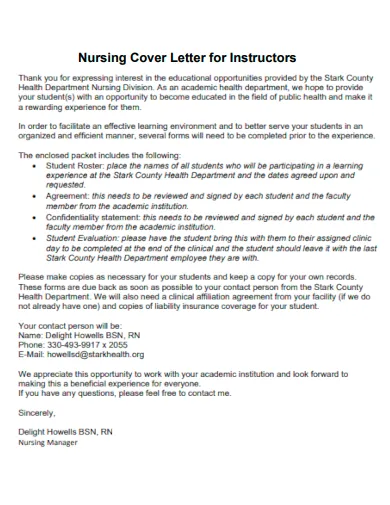
A master’s degree in nursing (MSN) is typically the minimum requirement for a nursing instructor position, although some institutions may prefer or require a doctorate (DNP or PhD). Your cover letter should clearly state your highest degree earned, the name of the institution, and the date of graduation. Mentioning any relevant certifications, such as Certified Nurse Educator (CNE) or advanced practice certifications, is highly recommended. If you are currently pursuing further education or certifications, mention that as well, showing your commitment to ongoing professional development. This demonstrates your dedication to lifelong learning and your eagerness to stay current with the latest nursing practices and educational strategies. Including this information is a key step in crafting a compelling nursing instructor cover letter.
Clinical Experience
Extensive clinical experience is a cornerstone of a successful nursing instructor. Your cover letter should detail the areas of nursing where you have experience, the length of your experience, and the types of patient populations you have worked with. Focus on experiences that are most relevant to the specific program and courses you are applying to teach. Mention any specialized skills or certifications you possess, such as advanced cardiac life support (ACLS) or pediatric advanced life support (PALS). Provide specific examples of how your clinical expertise has directly benefited patients or improved outcomes. Demonstrating your practical knowledge through concrete examples in your nursing instructor cover letter will help you stand out and give hiring managers confidence in your ability to effectively educate nursing students.
Teaching Experience
Teaching experience is another critical factor. If you have prior teaching experience, describe the courses you have taught, the level of students, and the instructional methods you have used. Highlight any positive outcomes or achievements, such as improved student performance or positive feedback from students. If you have limited teaching experience, emphasize any relevant skills, such as mentoring experience, presenting at conferences, or training colleagues. Mention any teaching certifications or workshops you have completed. Showcasing your ability to effectively communicate complex information, engage students, and create a positive learning environment is essential in your nursing instructor cover letter.
Crafting the Perfect Cover Letter
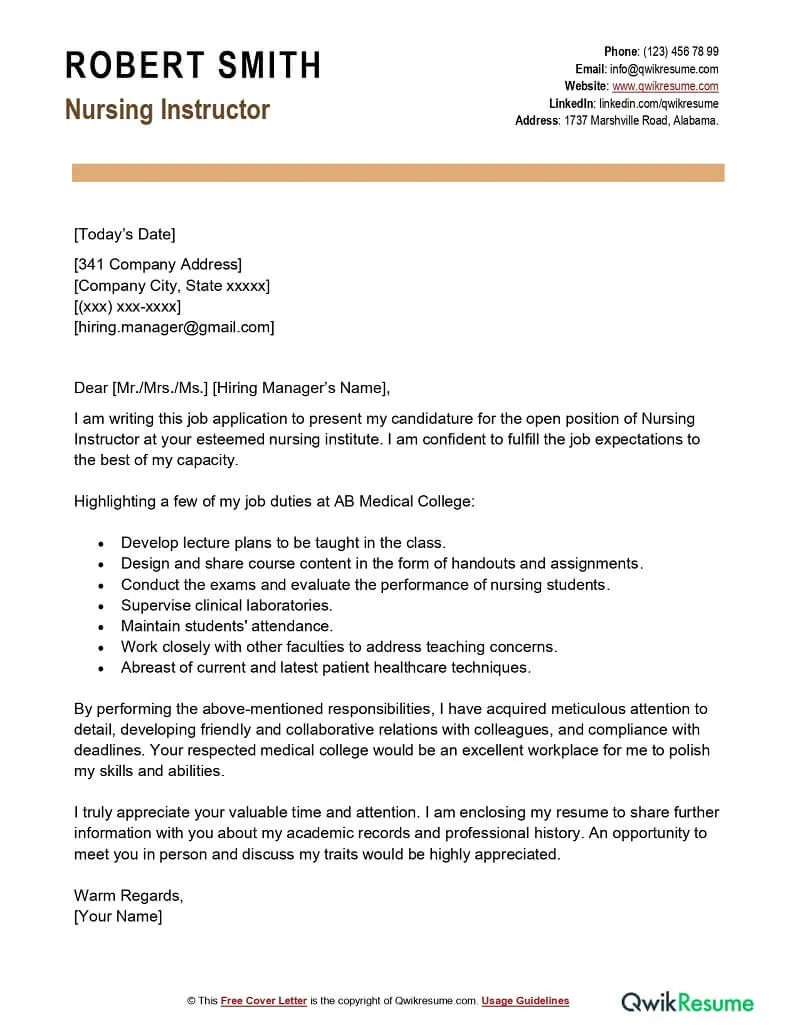
Writing a compelling cover letter is critical for securing a nursing instructor position. The structure, content, and tone of your letter can significantly impact the hiring manager’s perception of your candidacy. Therefore, it’s essential to format your cover letter in a professional manner and tailor it to the specific requirements of the job. The following sections provide detailed guidance on how to create a standout cover letter.
Formatting Your Cover Letter
Proper formatting ensures your cover letter is easy to read and presents a professional image. Stick to a standard business letter format, using a clear and readable font like Times New Roman or Arial in a size between 10 and 12 points. Ensure your margins are set to 1 inch on all sides. Keep the letter concise, ideally within one page. Avoid excessive jargon and ensure the layout is clean and well-organized. This attention to detail demonstrates your professionalism and respect for the hiring manager’s time, making a positive first impression with your nursing instructor cover letter.
Header and Contact Information
Your header should include your full name, address, phone number, and professional email address. It’s important to use a professional-sounding email address. Also, include the date and the hiring manager’s name and title, if available, and the name and address of the institution. Addressing the cover letter to a specific person shows that you’ve done your research and are genuinely interested in the position. If you are unsure of the hiring manager’s name, you can use a general salutation, but always try to find a specific contact to personalize your nursing instructor cover letter.
Salutation
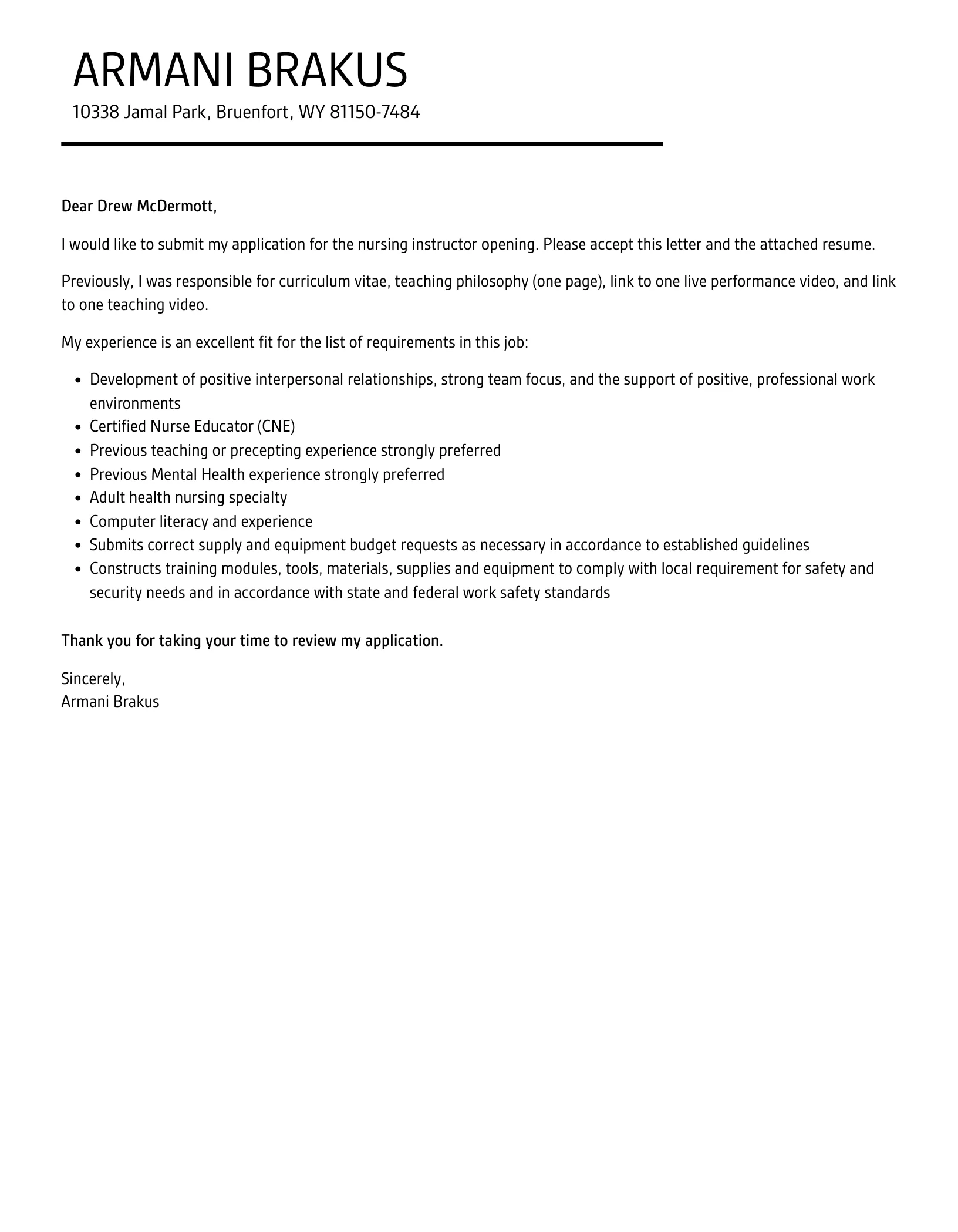
Use a professional salutation, such as “Dear Mr./Ms./Dr. [Last Name],” or “Dear Hiring Committee” if you don’t know the hiring manager’s name. Avoid generic greetings like “To Whom It May Concern.” When in doubt, it’s always better to err on the side of formality. This respectful tone sets a positive precedent for the rest of your nursing instructor cover letter.
Body Paragraphs
The body paragraphs are where you make your case. Structure your letter into three or four paragraphs, each serving a specific purpose. Each paragraph should be concise, focused, and persuasive, highlighting your qualifications and demonstrating your interest in the position. Be sure to proofread each paragraph carefully for grammar and spelling errors. The following subsections break down each body paragraph to guide you in writing your nursing instructor cover letter.
First Paragraph Introduction
Begin your cover letter by stating the position you are applying for and how you learned about the opportunity. Briefly mention your key qualifications and express your enthusiasm for the position. Make sure your introduction is clear, concise, and immediately grabs the reader’s attention. Your opening paragraph should leave the reader wanting to learn more about your candidacy, motivating them to continue reading your nursing instructor cover letter.
Second Paragraph Highlighting Qualifications
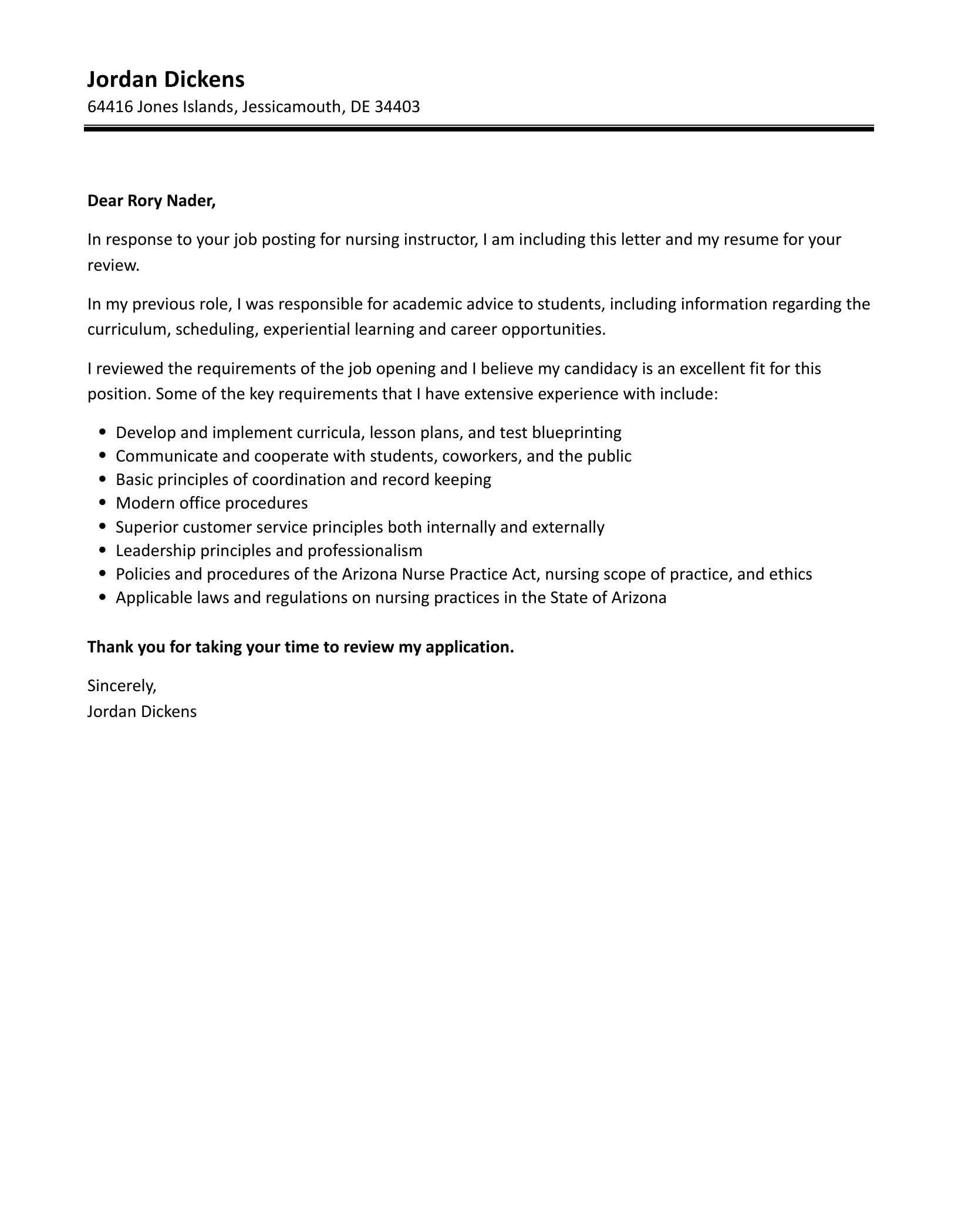
This is where you expand on your qualifications, providing specific examples that align with the job requirements. Refer to the job description and address the key skills and experiences the employer is seeking. Quantify your accomplishments whenever possible, using numbers and data to demonstrate your impact. For example, instead of saying “I improved student outcomes,” you could say “I increased student pass rates on the NCLEX by 15%.” This section should be the meat of your nursing instructor cover letter.
Third Paragraph Emphasizing Passion and Fit
Use this paragraph to highlight your passion for nursing education and explain why you are a good fit for the institution. Describe your teaching philosophy, your approach to student engagement, and how you foster a positive learning environment. Discuss your familiarity with the institution’s mission and values and how your goals align with theirs. If you have done any research about the program or its faculty, mention it here to show your genuine interest. This demonstrates your commitment to both nursing education and the specific institution in your nursing instructor cover letter.
Fourth Paragraph Call to Action
Conclude your cover letter by summarizing your interest in the position and reiterating your key qualifications. Express your availability for an interview and thank the hiring manager for their time and consideration. Providing your contact information again, and indicating that you are eager to discuss your qualifications further will give you a great chance to impress the hiring manager with your nursing instructor cover letter.
Closing Your Cover Letter
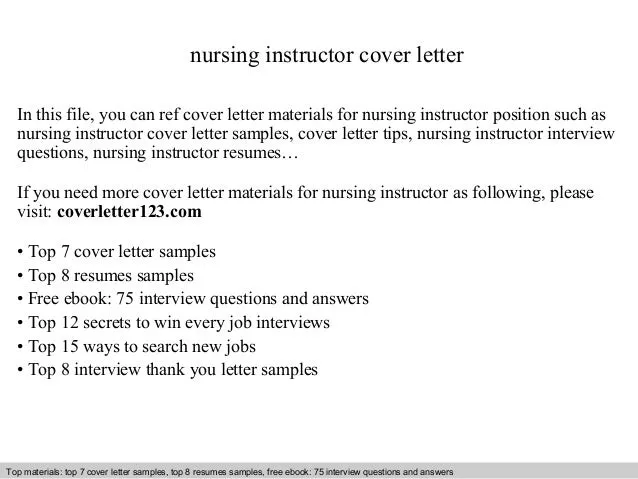
The closing of your cover letter should be as professional as the rest of the letter. Use a standard closing and ensure your signature is clear and legible. This final touch reinforces the professionalism and attention to detail you’ve demonstrated throughout the process.
Complimentary Close
Use a professional and formal closing, such as “Sincerely,” “Respectfully,” or “Best regards.” Avoid informal closings like “Thanks” or “Cheers.” This will leave the reader with a sense of professionalism from your nursing instructor cover letter.
Signature
Type your full name below your closing. If you are submitting a printed cover letter, leave space for your handwritten signature above your typed name. Make sure your signature is easy to read and matches your name. Ensure that you submit a clean, professional, and concise nursing instructor cover letter.
Essential Content to Include
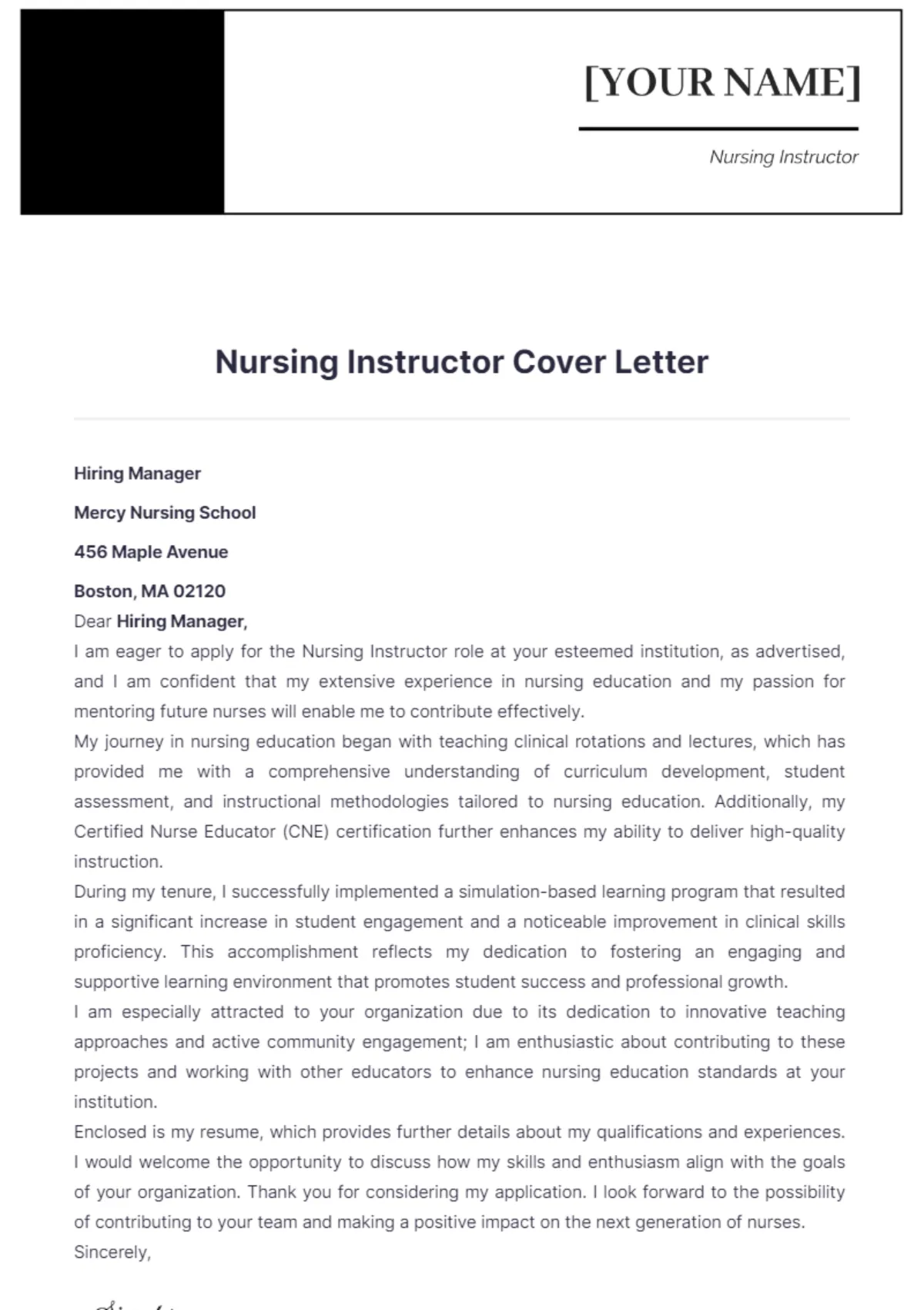
Certain elements are crucial to include in your nursing instructor cover letter to highlight your strengths and make a compelling case for your candidacy. Make sure you address your passion for nursing education, provide relevant skills and experience, address specific job requirements, and highlight your achievements and impact.
Your Passion for Nursing Education
Showcase your genuine passion for nursing education. Describe your teaching philosophy, your commitment to student success, and your enthusiasm for the profession. Explain why you enjoy teaching and mentoring nursing students, and how you plan to inspire the next generation of nurses. Sharing your passion will show the hiring committee that you’re dedicated to shaping future nurses and can create a vibrant learning environment in your nursing instructor cover letter.
Relevant Skills and Experience
Clearly outline your relevant skills and experience, including clinical expertise, teaching abilities, and any specialized knowledge. Provide specific examples of how you have used these skills to achieve positive outcomes in the past. Quantify your accomplishments whenever possible to demonstrate your impact. For example, mention any curriculum development experience or successful implementation of innovative teaching methods. Highlighting your skills and experience is critical to show that you’re an ideal candidate for the role in your nursing instructor cover letter.
Addressing the Specific Job Requirements
Carefully review the job description and address each requirement directly in your cover letter. Explain how your qualifications and experience meet the needs of the position. Tailor your letter to the specific requirements of the institution and the nursing program. This shows the hiring manager that you have carefully considered their needs and are a good fit for the role. Customizing your nursing instructor cover letter for each position demonstrates your attention to detail and genuine interest in the opportunity.
Highlighting Achievements and Impact
Highlight your achievements and the positive impact you have had in previous roles. Use the STAR method (Situation, Task, Action, Result) to describe your accomplishments. Quantify your results whenever possible, such as improved student pass rates, enhanced patient outcomes, or successful curriculum implementation. Providing tangible evidence of your success will make a strong case for your candidacy and demonstrate your value as a nursing instructor in your cover letter.
Proofreading and Editing Your Cover Letter
Thorough proofreading and editing are essential to ensure your cover letter is polished and error-free. Review your letter carefully for any grammatical errors, spelling mistakes, or formatting inconsistencies. Pay close attention to clarity and conciseness. The following subsections offer guidance on how to ensure your cover letter is perfect before submitting it.
Checking for Grammar and Spelling Errors
Carefully proofread your cover letter for any grammar or spelling mistakes. Use a spell checker and grammar checker, but don’t rely on them exclusively. Read your letter aloud to catch any awkward phrasing or sentences that don’t flow well. A mistake-free cover letter reflects your attention to detail and professionalism, and is essential for any nursing instructor cover letter.
Ensuring Clarity and Conciseness
Ensure your cover letter is clear, concise, and easy to understand. Avoid jargon or overly complex language. Each sentence should serve a purpose and contribute to the overall message. Make sure your key points are easy to identify. A well-written, concise cover letter demonstrates your ability to communicate effectively, an important quality for a nursing instructor, when crafting your nursing instructor cover letter.
Seeking Feedback from Others
Ask a trusted colleague, mentor, or career counselor to review your cover letter. They can provide valuable feedback on clarity, grammar, and overall effectiveness. Fresh eyes can often catch mistakes or suggest improvements that you might miss. Seeking feedback is a crucial step in the writing process and can significantly improve the quality of your nursing instructor cover letter.
